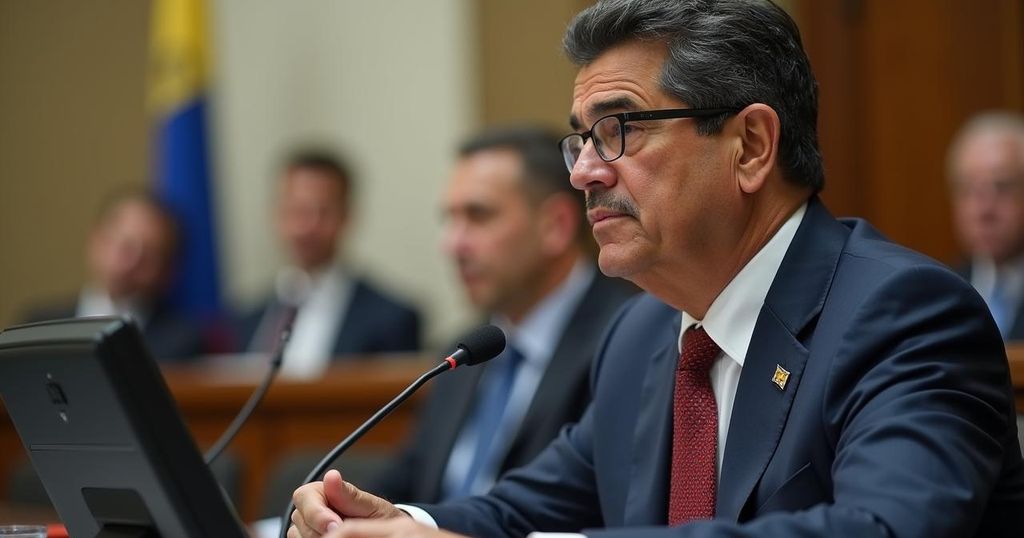Elvis Amoroso, the Venezuelan electoral official who declared Nicolás Maduro the winner of the July election, has been missing for ten weeks. His absence has sparked rumors of arrest and possible defection, raising questions about the legitimacy of Maduro’s presidency. The situation highlights concerns about repression in Venezuela, where many dissidents have been arrested amid claims of electoral fraud. Political analysts suggest that Amoroso’s potential confession regarding the election results could fundamentally threaten Maduro’s claim to power.
Elvis Amoroso, the Venezuelan electoral authority who announced Nicolás Maduro’s victory in the July presidential election, has been out of public view for ten weeks, inciting widespread speculation regarding his fate. Appointed by Maduro to lead the National Electoral Council, Amoroso’s absence has sparked rumors of his possible arrest in Argentina, extradition to the United States, or detention by security forces wary of his potential defection. Last seen on August 5, when he presented documents to the Supreme Court purporting that Maduro secured nearly 52% of the vote, Amoroso’s disappearance comes amid claims from opposition leaders asserting that Edmundo González, their candidate, was the true victor, garnering over 68% of the ballots. This assertion counters the narratives propagated by the regime and has received support from various sectors of the international community, including skepticism expressed by the United States regarding the election’s legitimacy. Recent speculations suggest that Amoroso may be confined at Fuerte Tiuna, a military complex in Caracas, after attempts to leave the country possibly raised alarms amongst regime officials. Antonio De La Cruz, president of the think-tank Inter American Trends, emphasized the critical nature of Amoroso’s role in maintaining Maduro’s hold on power. He stated, “This is a guy that the regime can’t allow to leave… If he defects and takes that away, Maduro’s claim to legitimacy collapses.” The regime has yet to publicly substantiate Amoroso’s claims, and his potential public dissent could pose a substantial threat to Maduro’s authority. Political scientist Jose Vicente Carrasquero warned, “It would be simply explosive for these people [in the regime] if he was to suddenly appear… declaring to a television station that he was given a paper to read and that was what he said on the night of the election.” Adding to the complexity of this situation is the ongoing repression in Venezuela, where nearly 2,000 individuals have been arrested amidst accusations of electoral fraud against Maduro, with reports alleging mistreatment and torture of those detained. Following his last public appearance, Amoroso ceased participation in regime events, fueling public discourse concerning his whereabouts. Despite early rumors regarding his arrest abroad, which were refuted by fact-checking organizations, his current status remains unknown, placing him in a precarious position given the potential threats associated with possessing sensitive information about the regime. Ivan Simonovis, a former intelligence chief to opposition leader Juan Guaidó, articulated that even if Amoroso were permitted to move, he would likely be under continuous surveillance by regime forces, highlighting the precariousness of his situation in relation to the regime’s operations.
The context of this situation pertains to the controversial presidential election held in Venezuela, where Nicolás Maduro’s victory has been met with considerable international skepticism. Many observers and opposition leaders claim that the electoral process was marred by fraud, casting doubt on the legitimacy of the results announced by officials such as Elvis Amoroso. The claims of manipulation and the subsequent disappearance of key figures who validate the election results underscore the repressive political climate in Venezuela, characterized by human rights abuses and suppression of dissent. The political dynamics surrounding Amoroso’s role are pivotal as they reflect the internal power struggles within the Maduro regime and the implications of electoral legitimacy in sustaining its authority.
Elvis Amoroso’s prolonged absence raises significant concerns regarding his safety and the implications for Nicolás Maduro’s regime. As a critical player in the legitimacy of the controversial electoral results, Amoroso’s potential defection or public criticism of the election could jeopardize Maduro’s position. The ongoing repression of dissent and political turmoil within Venezuela illustrates the dangers faced by figures such as Amoroso, whose knowledge of regime secrets renders them targets of intense scrutiny and pressure.
Original Source: www.miamiherald.com






